A Case Study on Ethical Issues Surrounding Vaccination Policies
VerifiedAdded on 2021/02/20
|15
|3798
|99
Case Study
AI Summary
This case study examines the ethical dilemmas surrounding vaccination, focusing on the spread of infectious diseases and the role of immunization. It explores the ethical issues arising from a measles vaccine contamination scandal, the subsequent decline in vaccination rates, and the government's response through compulsory vaccination policies. The study analyzes the perspectives of various stakeholders, including parents, healthcare providers, and government officials, considering the influence of factors like ethnicity, gender, and religion on the ethical dilemma. It applies ethical theories such as utilitarianism, consequentialism, and deontological ethics to assess the moral implications of different courses of action. The case study highlights potential conflicts, points of agreement, and the application of professional codes of conduct in deriving moral solutions, ultimately aiming to understand the complexities of balancing individual rights with public health concerns in the context of vaccination. The study also includes the discussion on the different ethical theories and their implications on the vaccination policies.
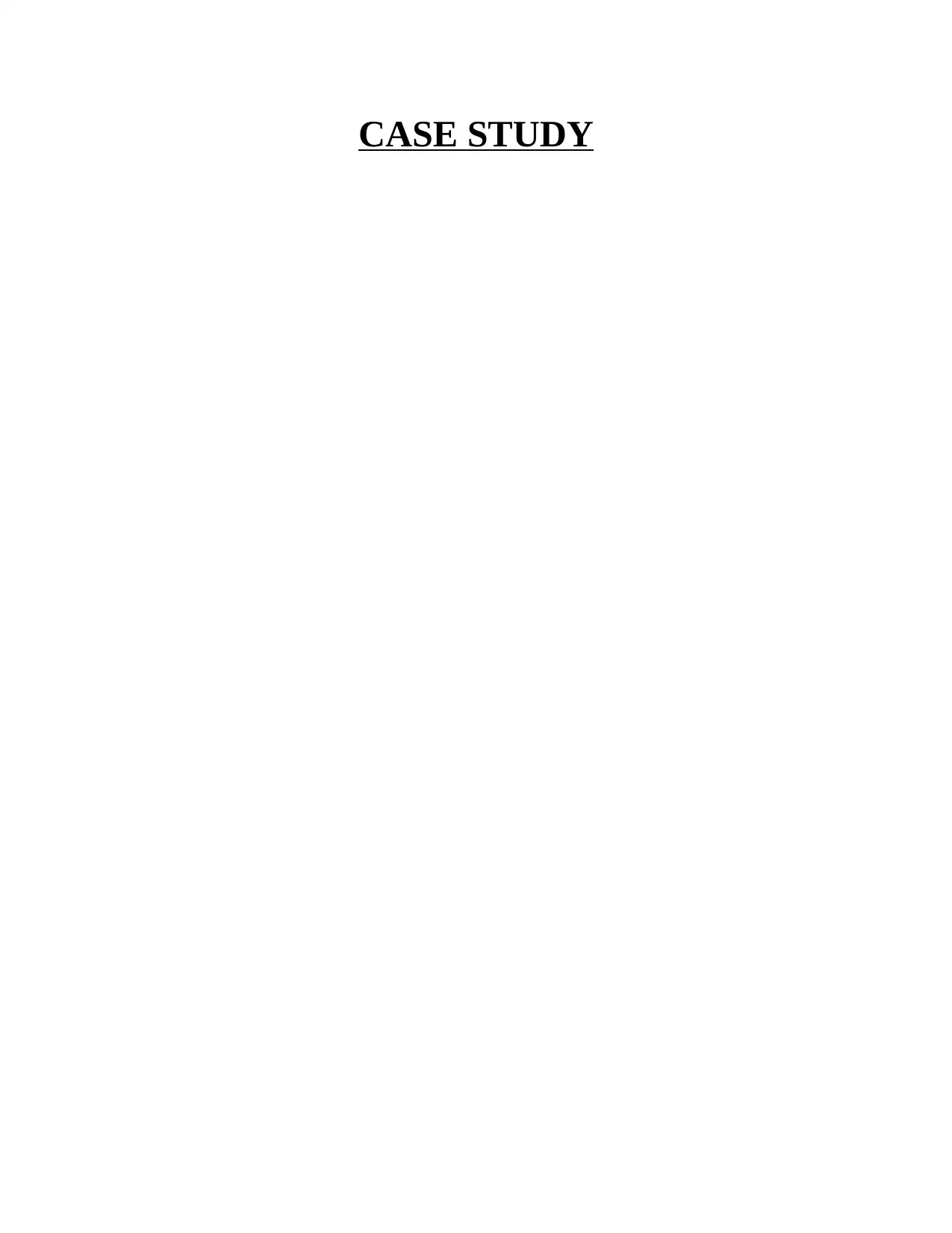
CASE STUDY
Paraphrase This Document
Need a fresh take? Get an instant paraphrase of this document with our AI Paraphraser
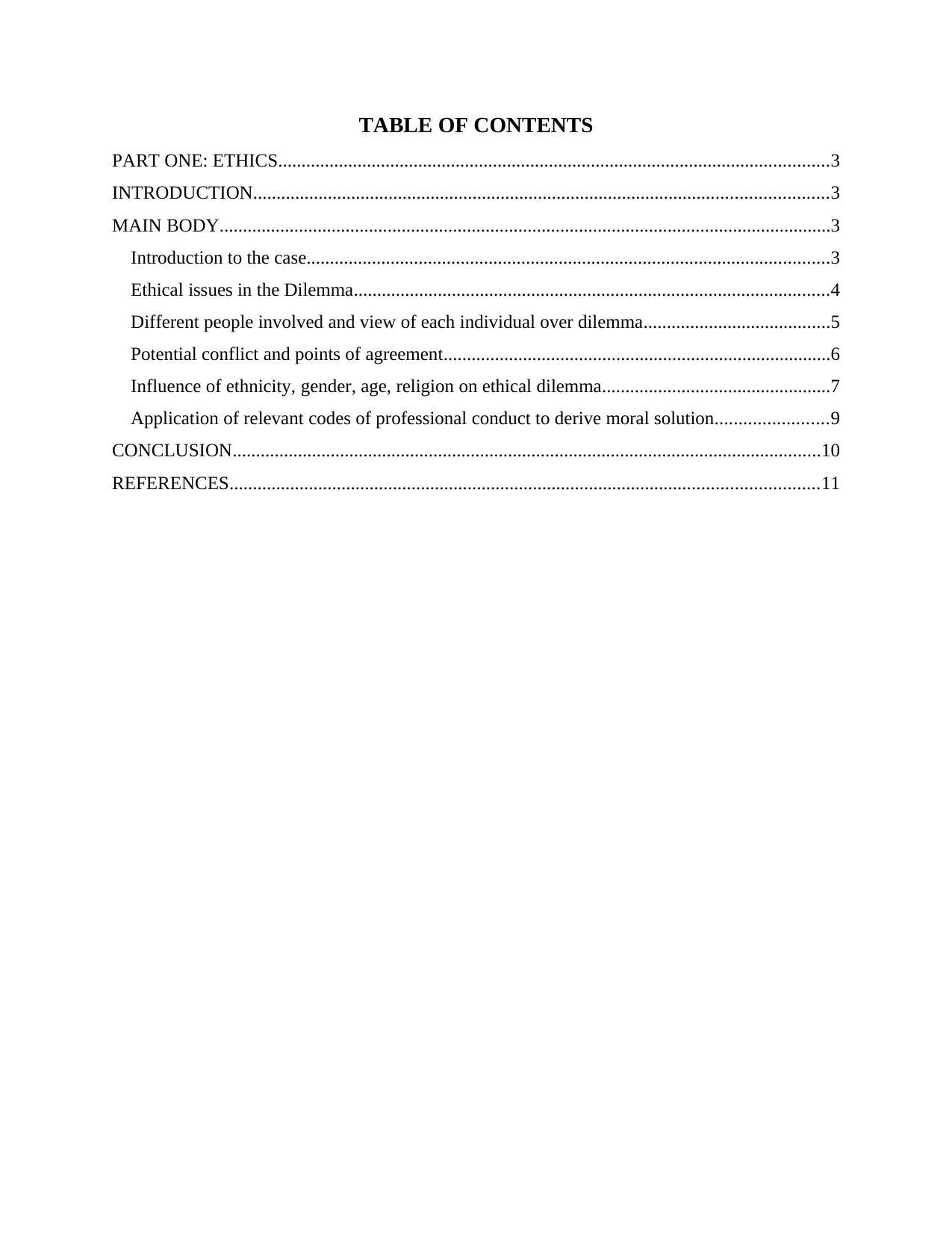
TABLE OF CONTENTS
PART ONE: ETHICS......................................................................................................................3
INTRODUCTION...........................................................................................................................3
MAIN BODY...................................................................................................................................3
Introduction to the case................................................................................................................3
Ethical issues in the Dilemma......................................................................................................4
Different people involved and view of each individual over dilemma........................................5
Potential conflict and points of agreement...................................................................................6
Influence of ethnicity, gender, age, religion on ethical dilemma.................................................7
Application of relevant codes of professional conduct to derive moral solution........................9
CONCLUSION..............................................................................................................................10
REFERENCES..............................................................................................................................11
PART ONE: ETHICS......................................................................................................................3
INTRODUCTION...........................................................................................................................3
MAIN BODY...................................................................................................................................3
Introduction to the case................................................................................................................3
Ethical issues in the Dilemma......................................................................................................4
Different people involved and view of each individual over dilemma........................................5
Potential conflict and points of agreement...................................................................................6
Influence of ethnicity, gender, age, religion on ethical dilemma.................................................7
Application of relevant codes of professional conduct to derive moral solution........................9
CONCLUSION..............................................................................................................................10
REFERENCES..............................................................................................................................11
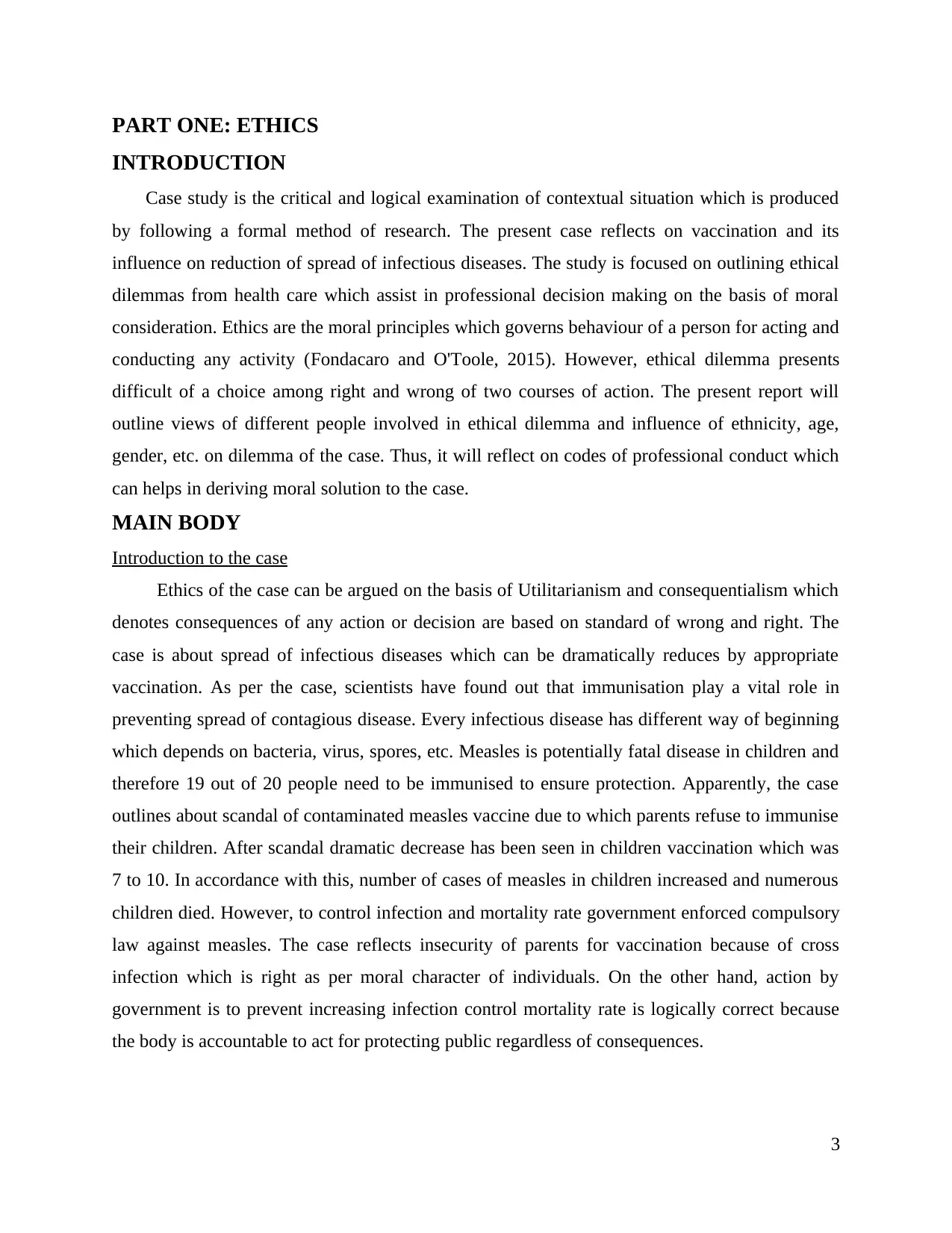
PART ONE: ETHICS
INTRODUCTION
Case study is the critical and logical examination of contextual situation which is produced
by following a formal method of research. The present case reflects on vaccination and its
influence on reduction of spread of infectious diseases. The study is focused on outlining ethical
dilemmas from health care which assist in professional decision making on the basis of moral
consideration. Ethics are the moral principles which governs behaviour of a person for acting and
conducting any activity (Fondacaro and O'Toole, 2015). However, ethical dilemma presents
difficult of a choice among right and wrong of two courses of action. The present report will
outline views of different people involved in ethical dilemma and influence of ethnicity, age,
gender, etc. on dilemma of the case. Thus, it will reflect on codes of professional conduct which
can helps in deriving moral solution to the case.
MAIN BODY
Introduction to the case
Ethics of the case can be argued on the basis of Utilitarianism and consequentialism which
denotes consequences of any action or decision are based on standard of wrong and right. The
case is about spread of infectious diseases which can be dramatically reduces by appropriate
vaccination. As per the case, scientists have found out that immunisation play a vital role in
preventing spread of contagious disease. Every infectious disease has different way of beginning
which depends on bacteria, virus, spores, etc. Measles is potentially fatal disease in children and
therefore 19 out of 20 people need to be immunised to ensure protection. Apparently, the case
outlines about scandal of contaminated measles vaccine due to which parents refuse to immunise
their children. After scandal dramatic decrease has been seen in children vaccination which was
7 to 10. In accordance with this, number of cases of measles in children increased and numerous
children died. However, to control infection and mortality rate government enforced compulsory
law against measles. The case reflects insecurity of parents for vaccination because of cross
infection which is right as per moral character of individuals. On the other hand, action by
government is to prevent increasing infection control mortality rate is logically correct because
the body is accountable to act for protecting public regardless of consequences.
3
INTRODUCTION
Case study is the critical and logical examination of contextual situation which is produced
by following a formal method of research. The present case reflects on vaccination and its
influence on reduction of spread of infectious diseases. The study is focused on outlining ethical
dilemmas from health care which assist in professional decision making on the basis of moral
consideration. Ethics are the moral principles which governs behaviour of a person for acting and
conducting any activity (Fondacaro and O'Toole, 2015). However, ethical dilemma presents
difficult of a choice among right and wrong of two courses of action. The present report will
outline views of different people involved in ethical dilemma and influence of ethnicity, age,
gender, etc. on dilemma of the case. Thus, it will reflect on codes of professional conduct which
can helps in deriving moral solution to the case.
MAIN BODY
Introduction to the case
Ethics of the case can be argued on the basis of Utilitarianism and consequentialism which
denotes consequences of any action or decision are based on standard of wrong and right. The
case is about spread of infectious diseases which can be dramatically reduces by appropriate
vaccination. As per the case, scientists have found out that immunisation play a vital role in
preventing spread of contagious disease. Every infectious disease has different way of beginning
which depends on bacteria, virus, spores, etc. Measles is potentially fatal disease in children and
therefore 19 out of 20 people need to be immunised to ensure protection. Apparently, the case
outlines about scandal of contaminated measles vaccine due to which parents refuse to immunise
their children. After scandal dramatic decrease has been seen in children vaccination which was
7 to 10. In accordance with this, number of cases of measles in children increased and numerous
children died. However, to control infection and mortality rate government enforced compulsory
law against measles. The case reflects insecurity of parents for vaccination because of cross
infection which is right as per moral character of individuals. On the other hand, action by
government is to prevent increasing infection control mortality rate is logically correct because
the body is accountable to act for protecting public regardless of consequences.
3
⊘ This is a preview!⊘
Do you want full access?
Subscribe today to unlock all pages.

Trusted by 1+ million students worldwide
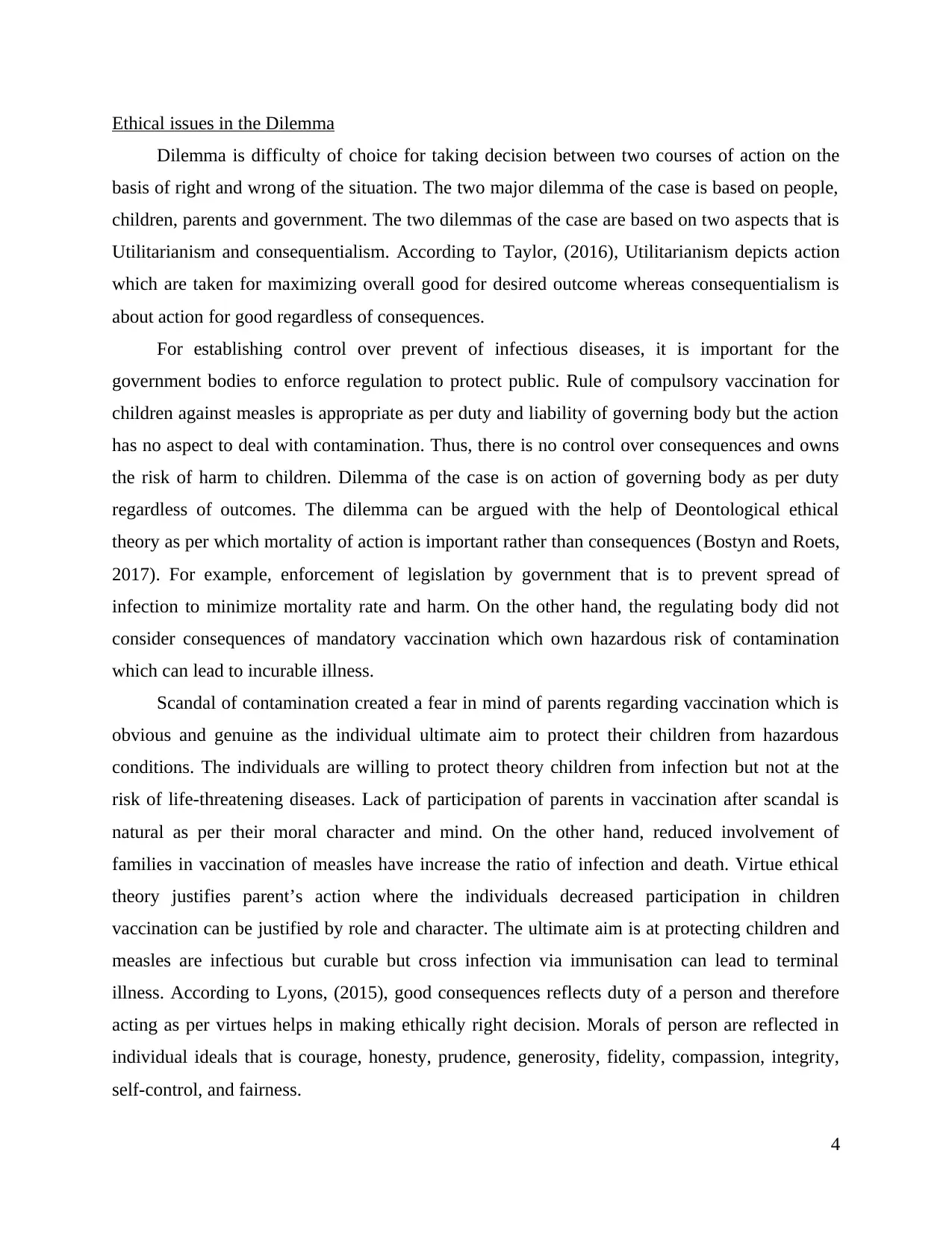
Ethical issues in the Dilemma
Dilemma is difficulty of choice for taking decision between two courses of action on the
basis of right and wrong of the situation. The two major dilemma of the case is based on people,
children, parents and government. The two dilemmas of the case are based on two aspects that is
Utilitarianism and consequentialism. According to Taylor, (2016), Utilitarianism depicts action
which are taken for maximizing overall good for desired outcome whereas consequentialism is
about action for good regardless of consequences.
For establishing control over prevent of infectious diseases, it is important for the
government bodies to enforce regulation to protect public. Rule of compulsory vaccination for
children against measles is appropriate as per duty and liability of governing body but the action
has no aspect to deal with contamination. Thus, there is no control over consequences and owns
the risk of harm to children. Dilemma of the case is on action of governing body as per duty
regardless of outcomes. The dilemma can be argued with the help of Deontological ethical
theory as per which mortality of action is important rather than consequences (Bostyn and Roets,
2017). For example, enforcement of legislation by government that is to prevent spread of
infection to minimize mortality rate and harm. On the other hand, the regulating body did not
consider consequences of mandatory vaccination which own hazardous risk of contamination
which can lead to incurable illness.
Scandal of contamination created a fear in mind of parents regarding vaccination which is
obvious and genuine as the individual ultimate aim to protect their children from hazardous
conditions. The individuals are willing to protect theory children from infection but not at the
risk of life-threatening diseases. Lack of participation of parents in vaccination after scandal is
natural as per their moral character and mind. On the other hand, reduced involvement of
families in vaccination of measles have increase the ratio of infection and death. Virtue ethical
theory justifies parent’s action where the individuals decreased participation in children
vaccination can be justified by role and character. The ultimate aim is at protecting children and
measles are infectious but curable but cross infection via immunisation can lead to terminal
illness. According to Lyons, (2015), good consequences reflects duty of a person and therefore
acting as per virtues helps in making ethically right decision. Morals of person are reflected in
individual ideals that is courage, honesty, prudence, generosity, fidelity, compassion, integrity,
self-control, and fairness.
4
Dilemma is difficulty of choice for taking decision between two courses of action on the
basis of right and wrong of the situation. The two major dilemma of the case is based on people,
children, parents and government. The two dilemmas of the case are based on two aspects that is
Utilitarianism and consequentialism. According to Taylor, (2016), Utilitarianism depicts action
which are taken for maximizing overall good for desired outcome whereas consequentialism is
about action for good regardless of consequences.
For establishing control over prevent of infectious diseases, it is important for the
government bodies to enforce regulation to protect public. Rule of compulsory vaccination for
children against measles is appropriate as per duty and liability of governing body but the action
has no aspect to deal with contamination. Thus, there is no control over consequences and owns
the risk of harm to children. Dilemma of the case is on action of governing body as per duty
regardless of outcomes. The dilemma can be argued with the help of Deontological ethical
theory as per which mortality of action is important rather than consequences (Bostyn and Roets,
2017). For example, enforcement of legislation by government that is to prevent spread of
infection to minimize mortality rate and harm. On the other hand, the regulating body did not
consider consequences of mandatory vaccination which own hazardous risk of contamination
which can lead to incurable illness.
Scandal of contamination created a fear in mind of parents regarding vaccination which is
obvious and genuine as the individual ultimate aim to protect their children from hazardous
conditions. The individuals are willing to protect theory children from infection but not at the
risk of life-threatening diseases. Lack of participation of parents in vaccination after scandal is
natural as per their moral character and mind. On the other hand, reduced involvement of
families in vaccination of measles have increase the ratio of infection and death. Virtue ethical
theory justifies parent’s action where the individuals decreased participation in children
vaccination can be justified by role and character. The ultimate aim is at protecting children and
measles are infectious but curable but cross infection via immunisation can lead to terminal
illness. According to Lyons, (2015), good consequences reflects duty of a person and therefore
acting as per virtues helps in making ethically right decision. Morals of person are reflected in
individual ideals that is courage, honesty, prudence, generosity, fidelity, compassion, integrity,
self-control, and fairness.
4
Paraphrase This Document
Need a fresh take? Get an instant paraphrase of this document with our AI Paraphraser
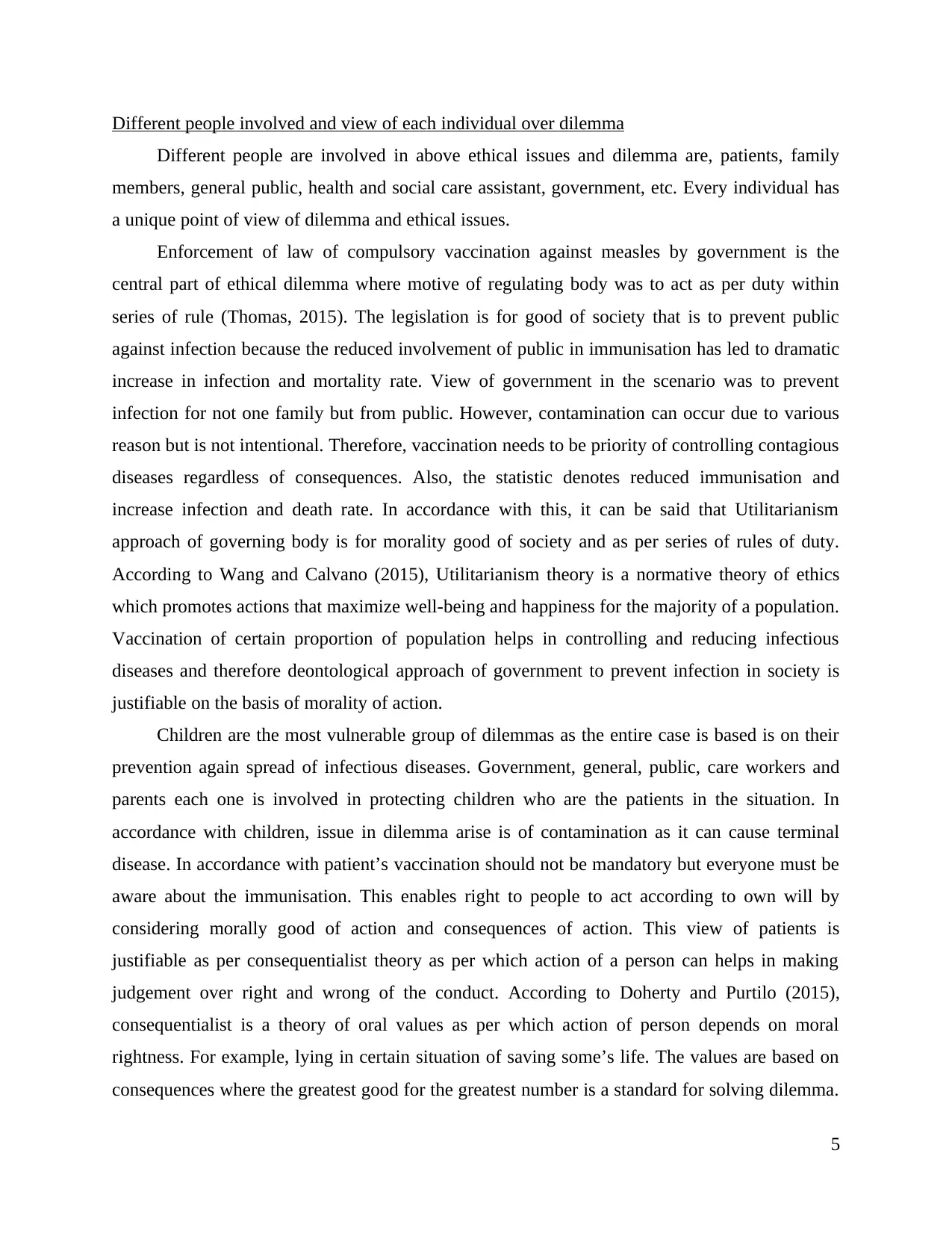
Different people involved and view of each individual over dilemma
Different people are involved in above ethical issues and dilemma are, patients, family
members, general public, health and social care assistant, government, etc. Every individual has
a unique point of view of dilemma and ethical issues.
Enforcement of law of compulsory vaccination against measles by government is the
central part of ethical dilemma where motive of regulating body was to act as per duty within
series of rule (Thomas, 2015). The legislation is for good of society that is to prevent public
against infection because the reduced involvement of public in immunisation has led to dramatic
increase in infection and mortality rate. View of government in the scenario was to prevent
infection for not one family but from public. However, contamination can occur due to various
reason but is not intentional. Therefore, vaccination needs to be priority of controlling contagious
diseases regardless of consequences. Also, the statistic denotes reduced immunisation and
increase infection and death rate. In accordance with this, it can be said that Utilitarianism
approach of governing body is for morality good of society and as per series of rules of duty.
According to Wang and Calvano (2015), Utilitarianism theory is a normative theory of ethics
which promotes actions that maximize well-being and happiness for the majority of a population.
Vaccination of certain proportion of population helps in controlling and reducing infectious
diseases and therefore deontological approach of government to prevent infection in society is
justifiable on the basis of morality of action.
Children are the most vulnerable group of dilemmas as the entire case is based is on their
prevention again spread of infectious diseases. Government, general, public, care workers and
parents each one is involved in protecting children who are the patients in the situation. In
accordance with children, issue in dilemma arise is of contamination as it can cause terminal
disease. In accordance with patient’s vaccination should not be mandatory but everyone must be
aware about the immunisation. This enables right to people to act according to own will by
considering morally good of action and consequences of action. This view of patients is
justifiable as per consequentialist theory as per which action of a person can helps in making
judgement over right and wrong of the conduct. According to Doherty and Purtilo (2015),
consequentialist is a theory of oral values as per which action of person depends on moral
rightness. For example, lying in certain situation of saving some’s life. The values are based on
consequences where the greatest good for the greatest number is a standard for solving dilemma.
5
Different people are involved in above ethical issues and dilemma are, patients, family
members, general public, health and social care assistant, government, etc. Every individual has
a unique point of view of dilemma and ethical issues.
Enforcement of law of compulsory vaccination against measles by government is the
central part of ethical dilemma where motive of regulating body was to act as per duty within
series of rule (Thomas, 2015). The legislation is for good of society that is to prevent public
against infection because the reduced involvement of public in immunisation has led to dramatic
increase in infection and mortality rate. View of government in the scenario was to prevent
infection for not one family but from public. However, contamination can occur due to various
reason but is not intentional. Therefore, vaccination needs to be priority of controlling contagious
diseases regardless of consequences. Also, the statistic denotes reduced immunisation and
increase infection and death rate. In accordance with this, it can be said that Utilitarianism
approach of governing body is for morality good of society and as per series of rules of duty.
According to Wang and Calvano (2015), Utilitarianism theory is a normative theory of ethics
which promotes actions that maximize well-being and happiness for the majority of a population.
Vaccination of certain proportion of population helps in controlling and reducing infectious
diseases and therefore deontological approach of government to prevent infection in society is
justifiable on the basis of morality of action.
Children are the most vulnerable group of dilemmas as the entire case is based is on their
prevention again spread of infectious diseases. Government, general, public, care workers and
parents each one is involved in protecting children who are the patients in the situation. In
accordance with children, issue in dilemma arise is of contamination as it can cause terminal
disease. In accordance with patient’s vaccination should not be mandatory but everyone must be
aware about the immunisation. This enables right to people to act according to own will by
considering morally good of action and consequences of action. This view of patients is
justifiable as per consequentialist theory as per which action of a person can helps in making
judgement over right and wrong of the conduct. According to Doherty and Purtilo (2015),
consequentialist is a theory of oral values as per which action of person depends on moral
rightness. For example, lying in certain situation of saving some’s life. The values are based on
consequences where the greatest good for the greatest number is a standard for solving dilemma.
5
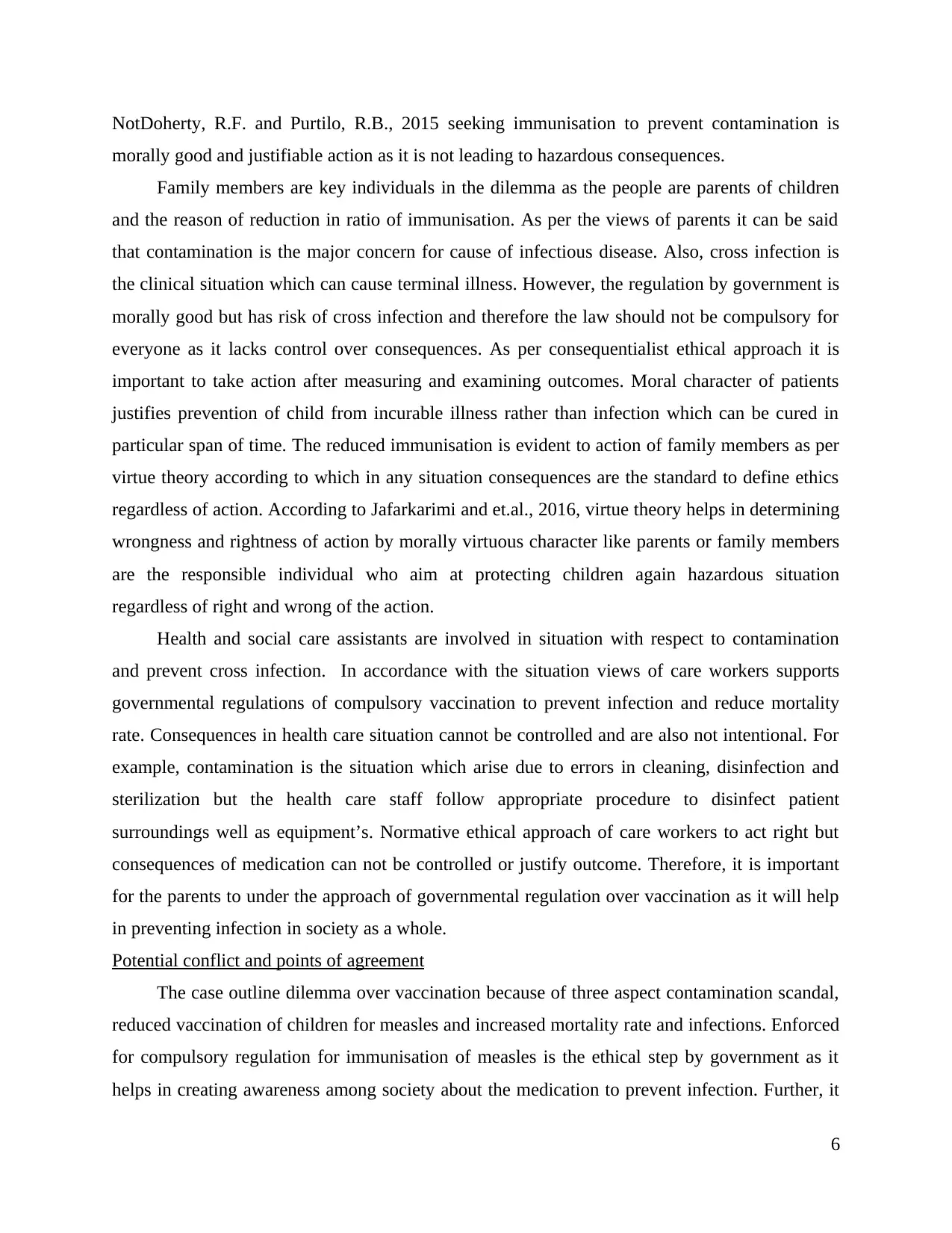
NotDoherty, R.F. and Purtilo, R.B., 2015 seeking immunisation to prevent contamination is
morally good and justifiable action as it is not leading to hazardous consequences.
Family members are key individuals in the dilemma as the people are parents of children
and the reason of reduction in ratio of immunisation. As per the views of parents it can be said
that contamination is the major concern for cause of infectious disease. Also, cross infection is
the clinical situation which can cause terminal illness. However, the regulation by government is
morally good but has risk of cross infection and therefore the law should not be compulsory for
everyone as it lacks control over consequences. As per consequentialist ethical approach it is
important to take action after measuring and examining outcomes. Moral character of patients
justifies prevention of child from incurable illness rather than infection which can be cured in
particular span of time. The reduced immunisation is evident to action of family members as per
virtue theory according to which in any situation consequences are the standard to define ethics
regardless of action. According to Jafarkarimi and et.al., 2016, virtue theory helps in determining
wrongness and rightness of action by morally virtuous character like parents or family members
are the responsible individual who aim at protecting children again hazardous situation
regardless of right and wrong of the action.
Health and social care assistants are involved in situation with respect to contamination
and prevent cross infection. In accordance with the situation views of care workers supports
governmental regulations of compulsory vaccination to prevent infection and reduce mortality
rate. Consequences in health care situation cannot be controlled and are also not intentional. For
example, contamination is the situation which arise due to errors in cleaning, disinfection and
sterilization but the health care staff follow appropriate procedure to disinfect patient
surroundings well as equipment’s. Normative ethical approach of care workers to act right but
consequences of medication can not be controlled or justify outcome. Therefore, it is important
for the parents to under the approach of governmental regulation over vaccination as it will help
in preventing infection in society as a whole.
Potential conflict and points of agreement
The case outline dilemma over vaccination because of three aspect contamination scandal,
reduced vaccination of children for measles and increased mortality rate and infections. Enforced
for compulsory regulation for immunisation of measles is the ethical step by government as it
helps in creating awareness among society about the medication to prevent infection. Further, it
6
morally good and justifiable action as it is not leading to hazardous consequences.
Family members are key individuals in the dilemma as the people are parents of children
and the reason of reduction in ratio of immunisation. As per the views of parents it can be said
that contamination is the major concern for cause of infectious disease. Also, cross infection is
the clinical situation which can cause terminal illness. However, the regulation by government is
morally good but has risk of cross infection and therefore the law should not be compulsory for
everyone as it lacks control over consequences. As per consequentialist ethical approach it is
important to take action after measuring and examining outcomes. Moral character of patients
justifies prevention of child from incurable illness rather than infection which can be cured in
particular span of time. The reduced immunisation is evident to action of family members as per
virtue theory according to which in any situation consequences are the standard to define ethics
regardless of action. According to Jafarkarimi and et.al., 2016, virtue theory helps in determining
wrongness and rightness of action by morally virtuous character like parents or family members
are the responsible individual who aim at protecting children again hazardous situation
regardless of right and wrong of the action.
Health and social care assistants are involved in situation with respect to contamination
and prevent cross infection. In accordance with the situation views of care workers supports
governmental regulations of compulsory vaccination to prevent infection and reduce mortality
rate. Consequences in health care situation cannot be controlled and are also not intentional. For
example, contamination is the situation which arise due to errors in cleaning, disinfection and
sterilization but the health care staff follow appropriate procedure to disinfect patient
surroundings well as equipment’s. Normative ethical approach of care workers to act right but
consequences of medication can not be controlled or justify outcome. Therefore, it is important
for the parents to under the approach of governmental regulation over vaccination as it will help
in preventing infection in society as a whole.
Potential conflict and points of agreement
The case outline dilemma over vaccination because of three aspect contamination scandal,
reduced vaccination of children for measles and increased mortality rate and infections. Enforced
for compulsory regulation for immunisation of measles is the ethical step by government as it
helps in creating awareness among society about the medication to prevent infection. Further, it
6
⊘ This is a preview!⊘
Do you want full access?
Subscribe today to unlock all pages.

Trusted by 1+ million students worldwide
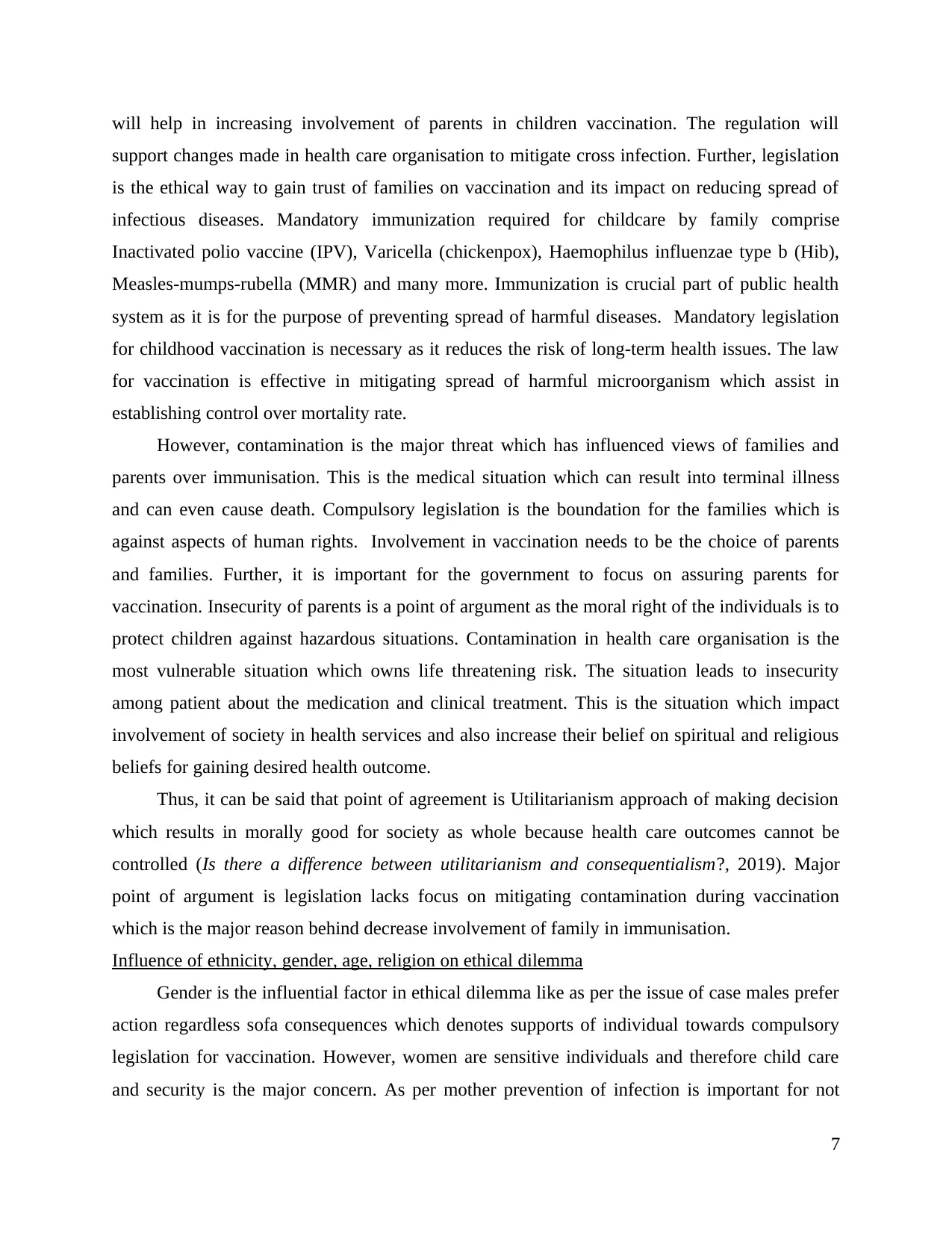
will help in increasing involvement of parents in children vaccination. The regulation will
support changes made in health care organisation to mitigate cross infection. Further, legislation
is the ethical way to gain trust of families on vaccination and its impact on reducing spread of
infectious diseases. Mandatory immunization required for childcare by family comprise
Inactivated polio vaccine (IPV), Varicella (chickenpox), Haemophilus influenzae type b (Hib),
Measles-mumps-rubella (MMR) and many more. Immunization is crucial part of public health
system as it is for the purpose of preventing spread of harmful diseases. Mandatory legislation
for childhood vaccination is necessary as it reduces the risk of long-term health issues. The law
for vaccination is effective in mitigating spread of harmful microorganism which assist in
establishing control over mortality rate.
However, contamination is the major threat which has influenced views of families and
parents over immunisation. This is the medical situation which can result into terminal illness
and can even cause death. Compulsory legislation is the boundation for the families which is
against aspects of human rights. Involvement in vaccination needs to be the choice of parents
and families. Further, it is important for the government to focus on assuring parents for
vaccination. Insecurity of parents is a point of argument as the moral right of the individuals is to
protect children against hazardous situations. Contamination in health care organisation is the
most vulnerable situation which owns life threatening risk. The situation leads to insecurity
among patient about the medication and clinical treatment. This is the situation which impact
involvement of society in health services and also increase their belief on spiritual and religious
beliefs for gaining desired health outcome.
Thus, it can be said that point of agreement is Utilitarianism approach of making decision
which results in morally good for society as whole because health care outcomes cannot be
controlled (Is there a difference between utilitarianism and consequentialism?, 2019). Major
point of argument is legislation lacks focus on mitigating contamination during vaccination
which is the major reason behind decrease involvement of family in immunisation.
Influence of ethnicity, gender, age, religion on ethical dilemma
Gender is the influential factor in ethical dilemma like as per the issue of case males prefer
action regardless sofa consequences which denotes supports of individual towards compulsory
legislation for vaccination. However, women are sensitive individuals and therefore child care
and security is the major concern. As per mother prevention of infection is important for not
7
support changes made in health care organisation to mitigate cross infection. Further, legislation
is the ethical way to gain trust of families on vaccination and its impact on reducing spread of
infectious diseases. Mandatory immunization required for childcare by family comprise
Inactivated polio vaccine (IPV), Varicella (chickenpox), Haemophilus influenzae type b (Hib),
Measles-mumps-rubella (MMR) and many more. Immunization is crucial part of public health
system as it is for the purpose of preventing spread of harmful diseases. Mandatory legislation
for childhood vaccination is necessary as it reduces the risk of long-term health issues. The law
for vaccination is effective in mitigating spread of harmful microorganism which assist in
establishing control over mortality rate.
However, contamination is the major threat which has influenced views of families and
parents over immunisation. This is the medical situation which can result into terminal illness
and can even cause death. Compulsory legislation is the boundation for the families which is
against aspects of human rights. Involvement in vaccination needs to be the choice of parents
and families. Further, it is important for the government to focus on assuring parents for
vaccination. Insecurity of parents is a point of argument as the moral right of the individuals is to
protect children against hazardous situations. Contamination in health care organisation is the
most vulnerable situation which owns life threatening risk. The situation leads to insecurity
among patient about the medication and clinical treatment. This is the situation which impact
involvement of society in health services and also increase their belief on spiritual and religious
beliefs for gaining desired health outcome.
Thus, it can be said that point of agreement is Utilitarianism approach of making decision
which results in morally good for society as whole because health care outcomes cannot be
controlled (Is there a difference between utilitarianism and consequentialism?, 2019). Major
point of argument is legislation lacks focus on mitigating contamination during vaccination
which is the major reason behind decrease involvement of family in immunisation.
Influence of ethnicity, gender, age, religion on ethical dilemma
Gender is the influential factor in ethical dilemma like as per the issue of case males prefer
action regardless sofa consequences which denotes supports of individual towards compulsory
legislation for vaccination. However, women are sensitive individuals and therefore child care
and security is the major concern. As per mother prevention of infection is important for not
7
Paraphrase This Document
Need a fresh take? Get an instant paraphrase of this document with our AI Paraphraser
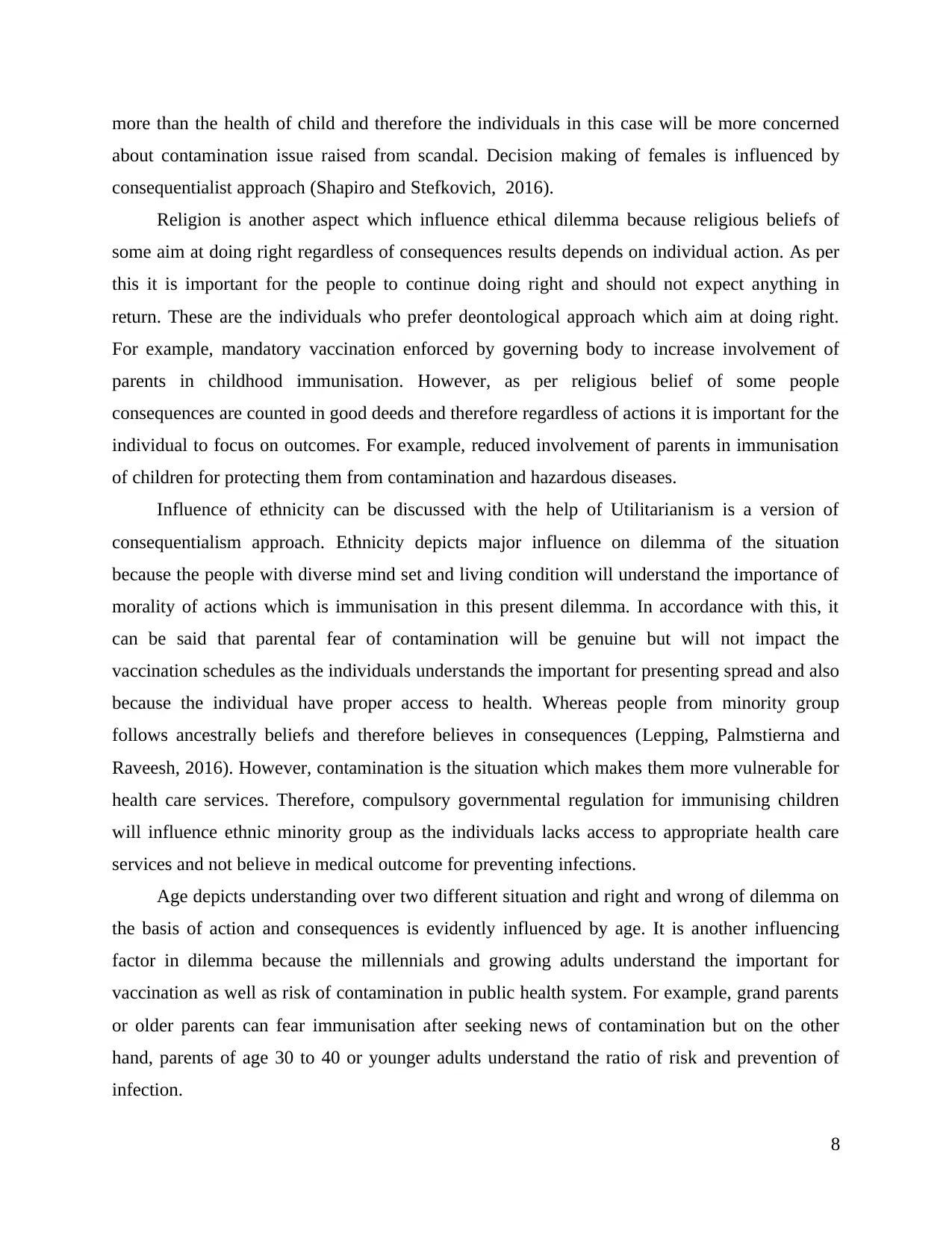
more than the health of child and therefore the individuals in this case will be more concerned
about contamination issue raised from scandal. Decision making of females is influenced by
consequentialist approach (Shapiro and Stefkovich, 2016).
Religion is another aspect which influence ethical dilemma because religious beliefs of
some aim at doing right regardless of consequences results depends on individual action. As per
this it is important for the people to continue doing right and should not expect anything in
return. These are the individuals who prefer deontological approach which aim at doing right.
For example, mandatory vaccination enforced by governing body to increase involvement of
parents in childhood immunisation. However, as per religious belief of some people
consequences are counted in good deeds and therefore regardless of actions it is important for the
individual to focus on outcomes. For example, reduced involvement of parents in immunisation
of children for protecting them from contamination and hazardous diseases.
Influence of ethnicity can be discussed with the help of Utilitarianism is a version of
consequentialism approach. Ethnicity depicts major influence on dilemma of the situation
because the people with diverse mind set and living condition will understand the importance of
morality of actions which is immunisation in this present dilemma. In accordance with this, it
can be said that parental fear of contamination will be genuine but will not impact the
vaccination schedules as the individuals understands the important for presenting spread and also
because the individual have proper access to health. Whereas people from minority group
follows ancestrally beliefs and therefore believes in consequences (Lepping, Palmstierna and
Raveesh, 2016). However, contamination is the situation which makes them more vulnerable for
health care services. Therefore, compulsory governmental regulation for immunising children
will influence ethnic minority group as the individuals lacks access to appropriate health care
services and not believe in medical outcome for preventing infections.
Age depicts understanding over two different situation and right and wrong of dilemma on
the basis of action and consequences is evidently influenced by age. It is another influencing
factor in dilemma because the millennials and growing adults understand the important for
vaccination as well as risk of contamination in public health system. For example, grand parents
or older parents can fear immunisation after seeking news of contamination but on the other
hand, parents of age 30 to 40 or younger adults understand the ratio of risk and prevention of
infection.
8
about contamination issue raised from scandal. Decision making of females is influenced by
consequentialist approach (Shapiro and Stefkovich, 2016).
Religion is another aspect which influence ethical dilemma because religious beliefs of
some aim at doing right regardless of consequences results depends on individual action. As per
this it is important for the people to continue doing right and should not expect anything in
return. These are the individuals who prefer deontological approach which aim at doing right.
For example, mandatory vaccination enforced by governing body to increase involvement of
parents in childhood immunisation. However, as per religious belief of some people
consequences are counted in good deeds and therefore regardless of actions it is important for the
individual to focus on outcomes. For example, reduced involvement of parents in immunisation
of children for protecting them from contamination and hazardous diseases.
Influence of ethnicity can be discussed with the help of Utilitarianism is a version of
consequentialism approach. Ethnicity depicts major influence on dilemma of the situation
because the people with diverse mind set and living condition will understand the importance of
morality of actions which is immunisation in this present dilemma. In accordance with this, it
can be said that parental fear of contamination will be genuine but will not impact the
vaccination schedules as the individuals understands the important for presenting spread and also
because the individual have proper access to health. Whereas people from minority group
follows ancestrally beliefs and therefore believes in consequences (Lepping, Palmstierna and
Raveesh, 2016). However, contamination is the situation which makes them more vulnerable for
health care services. Therefore, compulsory governmental regulation for immunising children
will influence ethnic minority group as the individuals lacks access to appropriate health care
services and not believe in medical outcome for preventing infections.
Age depicts understanding over two different situation and right and wrong of dilemma on
the basis of action and consequences is evidently influenced by age. It is another influencing
factor in dilemma because the millennials and growing adults understand the important for
vaccination as well as risk of contamination in public health system. For example, grand parents
or older parents can fear immunisation after seeking news of contamination but on the other
hand, parents of age 30 to 40 or younger adults understand the ratio of risk and prevention of
infection.
8
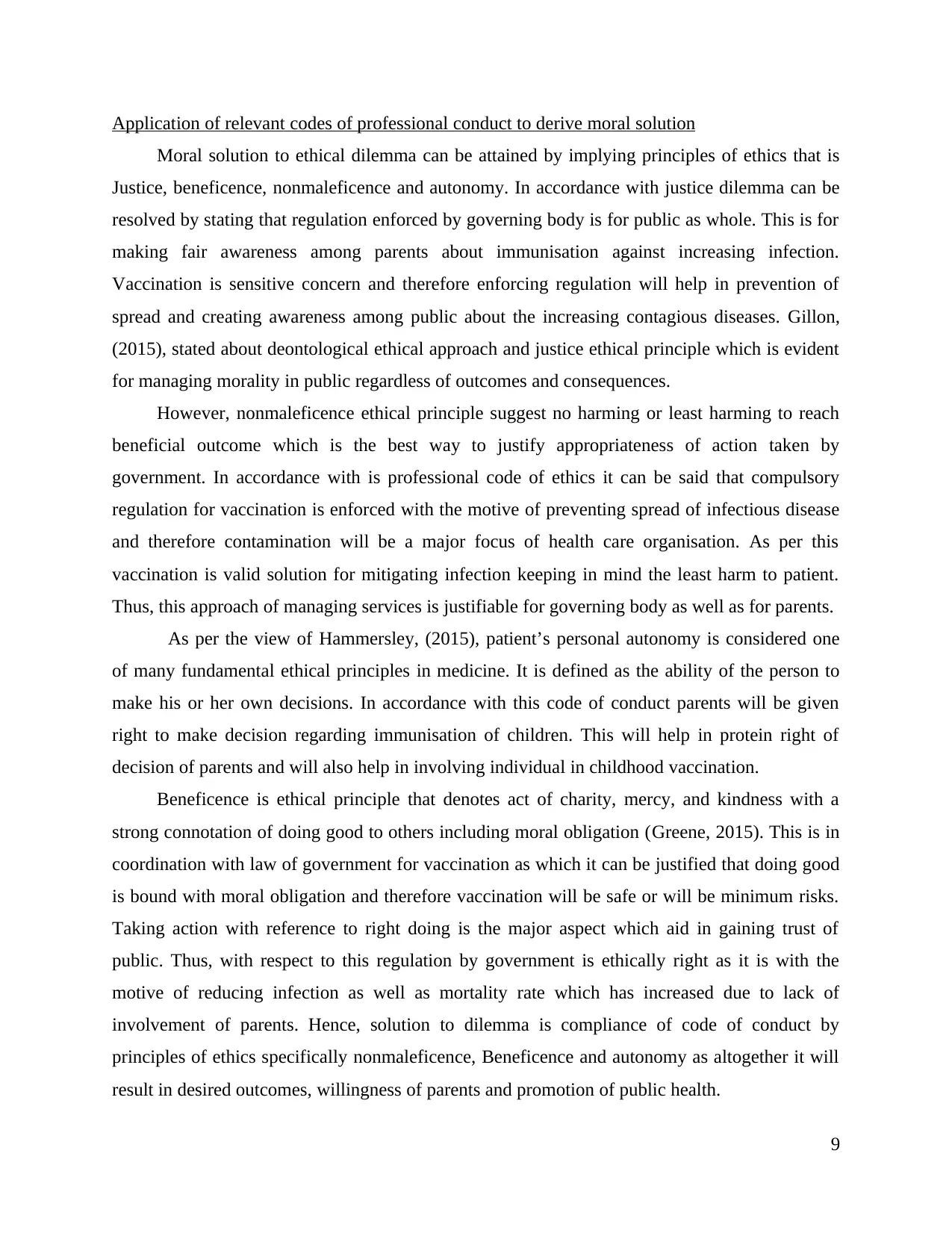
Application of relevant codes of professional conduct to derive moral solution
Moral solution to ethical dilemma can be attained by implying principles of ethics that is
Justice, beneficence, nonmaleficence and autonomy. In accordance with justice dilemma can be
resolved by stating that regulation enforced by governing body is for public as whole. This is for
making fair awareness among parents about immunisation against increasing infection.
Vaccination is sensitive concern and therefore enforcing regulation will help in prevention of
spread and creating awareness among public about the increasing contagious diseases. Gillon,
(2015), stated about deontological ethical approach and justice ethical principle which is evident
for managing morality in public regardless of outcomes and consequences.
However, nonmaleficence ethical principle suggest no harming or least harming to reach
beneficial outcome which is the best way to justify appropriateness of action taken by
government. In accordance with is professional code of ethics it can be said that compulsory
regulation for vaccination is enforced with the motive of preventing spread of infectious disease
and therefore contamination will be a major focus of health care organisation. As per this
vaccination is valid solution for mitigating infection keeping in mind the least harm to patient.
Thus, this approach of managing services is justifiable for governing body as well as for parents.
As per the view of Hammersley, (2015), patient’s personal autonomy is considered one
of many fundamental ethical principles in medicine. It is defined as the ability of the person to
make his or her own decisions. In accordance with this code of conduct parents will be given
right to make decision regarding immunisation of children. This will help in protein right of
decision of parents and will also help in involving individual in childhood vaccination.
Beneficence is ethical principle that denotes act of charity, mercy, and kindness with a
strong connotation of doing good to others including moral obligation (Greene, 2015). This is in
coordination with law of government for vaccination as which it can be justified that doing good
is bound with moral obligation and therefore vaccination will be safe or will be minimum risks.
Taking action with reference to right doing is the major aspect which aid in gaining trust of
public. Thus, with respect to this regulation by government is ethically right as it is with the
motive of reducing infection as well as mortality rate which has increased due to lack of
involvement of parents. Hence, solution to dilemma is compliance of code of conduct by
principles of ethics specifically nonmaleficence, Beneficence and autonomy as altogether it will
result in desired outcomes, willingness of parents and promotion of public health.
9
Moral solution to ethical dilemma can be attained by implying principles of ethics that is
Justice, beneficence, nonmaleficence and autonomy. In accordance with justice dilemma can be
resolved by stating that regulation enforced by governing body is for public as whole. This is for
making fair awareness among parents about immunisation against increasing infection.
Vaccination is sensitive concern and therefore enforcing regulation will help in prevention of
spread and creating awareness among public about the increasing contagious diseases. Gillon,
(2015), stated about deontological ethical approach and justice ethical principle which is evident
for managing morality in public regardless of outcomes and consequences.
However, nonmaleficence ethical principle suggest no harming or least harming to reach
beneficial outcome which is the best way to justify appropriateness of action taken by
government. In accordance with is professional code of ethics it can be said that compulsory
regulation for vaccination is enforced with the motive of preventing spread of infectious disease
and therefore contamination will be a major focus of health care organisation. As per this
vaccination is valid solution for mitigating infection keeping in mind the least harm to patient.
Thus, this approach of managing services is justifiable for governing body as well as for parents.
As per the view of Hammersley, (2015), patient’s personal autonomy is considered one
of many fundamental ethical principles in medicine. It is defined as the ability of the person to
make his or her own decisions. In accordance with this code of conduct parents will be given
right to make decision regarding immunisation of children. This will help in protein right of
decision of parents and will also help in involving individual in childhood vaccination.
Beneficence is ethical principle that denotes act of charity, mercy, and kindness with a
strong connotation of doing good to others including moral obligation (Greene, 2015). This is in
coordination with law of government for vaccination as which it can be justified that doing good
is bound with moral obligation and therefore vaccination will be safe or will be minimum risks.
Taking action with reference to right doing is the major aspect which aid in gaining trust of
public. Thus, with respect to this regulation by government is ethically right as it is with the
motive of reducing infection as well as mortality rate which has increased due to lack of
involvement of parents. Hence, solution to dilemma is compliance of code of conduct by
principles of ethics specifically nonmaleficence, Beneficence and autonomy as altogether it will
result in desired outcomes, willingness of parents and promotion of public health.
9
⊘ This is a preview!⊘
Do you want full access?
Subscribe today to unlock all pages.

Trusted by 1+ million students worldwide
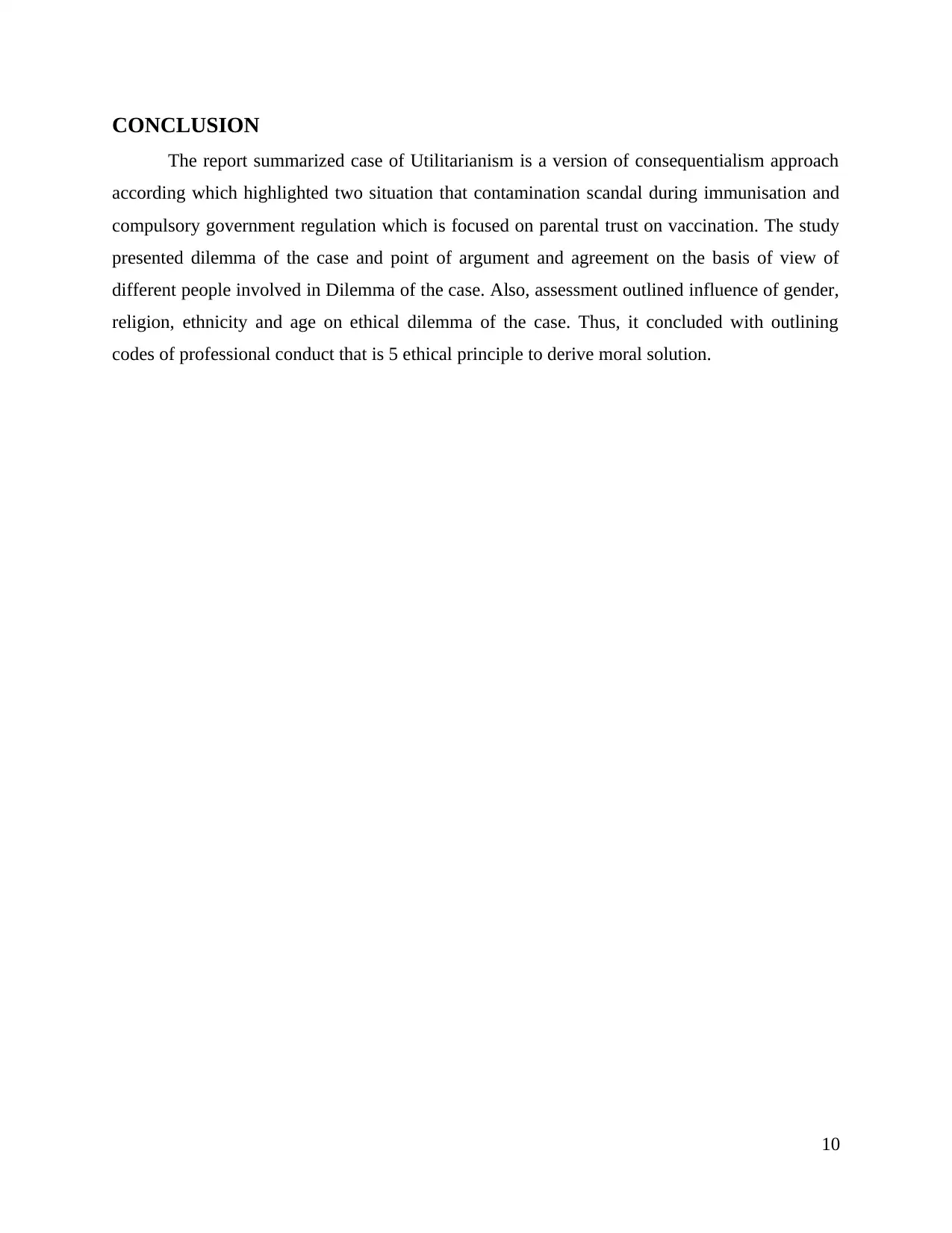
CONCLUSION
The report summarized case of Utilitarianism is a version of consequentialism approach
according which highlighted two situation that contamination scandal during immunisation and
compulsory government regulation which is focused on parental trust on vaccination. The study
presented dilemma of the case and point of argument and agreement on the basis of view of
different people involved in Dilemma of the case. Also, assessment outlined influence of gender,
religion, ethnicity and age on ethical dilemma of the case. Thus, it concluded with outlining
codes of professional conduct that is 5 ethical principle to derive moral solution.
10
The report summarized case of Utilitarianism is a version of consequentialism approach
according which highlighted two situation that contamination scandal during immunisation and
compulsory government regulation which is focused on parental trust on vaccination. The study
presented dilemma of the case and point of argument and agreement on the basis of view of
different people involved in Dilemma of the case. Also, assessment outlined influence of gender,
religion, ethnicity and age on ethical dilemma of the case. Thus, it concluded with outlining
codes of professional conduct that is 5 ethical principle to derive moral solution.
10
Paraphrase This Document
Need a fresh take? Get an instant paraphrase of this document with our AI Paraphraser
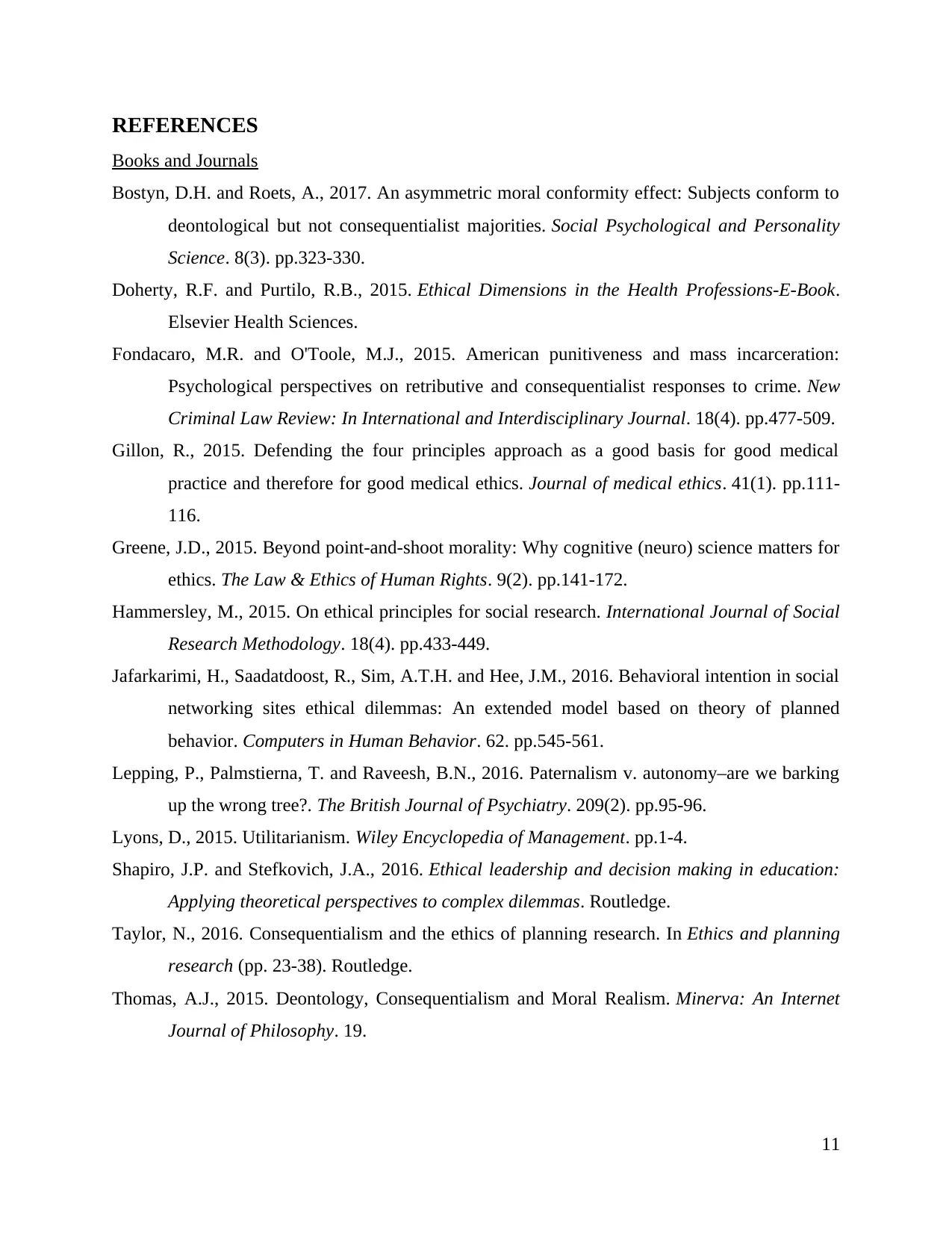
REFERENCES
Books and Journals
Bostyn, D.H. and Roets, A., 2017. An asymmetric moral conformity effect: Subjects conform to
deontological but not consequentialist majorities. Social Psychological and Personality
Science. 8(3). pp.323-330.
Doherty, R.F. and Purtilo, R.B., 2015. Ethical Dimensions in the Health Professions-E-Book.
Elsevier Health Sciences.
Fondacaro, M.R. and O'Toole, M.J., 2015. American punitiveness and mass incarceration:
Psychological perspectives on retributive and consequentialist responses to crime. New
Criminal Law Review: In International and Interdisciplinary Journal. 18(4). pp.477-509.
Gillon, R., 2015. Defending the four principles approach as a good basis for good medical
practice and therefore for good medical ethics. Journal of medical ethics. 41(1). pp.111-
116.
Greene, J.D., 2015. Beyond point-and-shoot morality: Why cognitive (neuro) science matters for
ethics. The Law & Ethics of Human Rights. 9(2). pp.141-172.
Hammersley, M., 2015. On ethical principles for social research. International Journal of Social
Research Methodology. 18(4). pp.433-449.
Jafarkarimi, H., Saadatdoost, R., Sim, A.T.H. and Hee, J.M., 2016. Behavioral intention in social
networking sites ethical dilemmas: An extended model based on theory of planned
behavior. Computers in Human Behavior. 62. pp.545-561.
Lepping, P., Palmstierna, T. and Raveesh, B.N., 2016. Paternalism v. autonomy–are we barking
up the wrong tree?. The British Journal of Psychiatry. 209(2). pp.95-96.
Lyons, D., 2015. Utilitarianism. Wiley Encyclopedia of Management. pp.1-4.
Shapiro, J.P. and Stefkovich, J.A., 2016. Ethical leadership and decision making in education:
Applying theoretical perspectives to complex dilemmas. Routledge.
Taylor, N., 2016. Consequentialism and the ethics of planning research. In Ethics and planning
research (pp. 23-38). Routledge.
Thomas, A.J., 2015. Deontology, Consequentialism and Moral Realism. Minerva: An Internet
Journal of Philosophy. 19.
11
Books and Journals
Bostyn, D.H. and Roets, A., 2017. An asymmetric moral conformity effect: Subjects conform to
deontological but not consequentialist majorities. Social Psychological and Personality
Science. 8(3). pp.323-330.
Doherty, R.F. and Purtilo, R.B., 2015. Ethical Dimensions in the Health Professions-E-Book.
Elsevier Health Sciences.
Fondacaro, M.R. and O'Toole, M.J., 2015. American punitiveness and mass incarceration:
Psychological perspectives on retributive and consequentialist responses to crime. New
Criminal Law Review: In International and Interdisciplinary Journal. 18(4). pp.477-509.
Gillon, R., 2015. Defending the four principles approach as a good basis for good medical
practice and therefore for good medical ethics. Journal of medical ethics. 41(1). pp.111-
116.
Greene, J.D., 2015. Beyond point-and-shoot morality: Why cognitive (neuro) science matters for
ethics. The Law & Ethics of Human Rights. 9(2). pp.141-172.
Hammersley, M., 2015. On ethical principles for social research. International Journal of Social
Research Methodology. 18(4). pp.433-449.
Jafarkarimi, H., Saadatdoost, R., Sim, A.T.H. and Hee, J.M., 2016. Behavioral intention in social
networking sites ethical dilemmas: An extended model based on theory of planned
behavior. Computers in Human Behavior. 62. pp.545-561.
Lepping, P., Palmstierna, T. and Raveesh, B.N., 2016. Paternalism v. autonomy–are we barking
up the wrong tree?. The British Journal of Psychiatry. 209(2). pp.95-96.
Lyons, D., 2015. Utilitarianism. Wiley Encyclopedia of Management. pp.1-4.
Shapiro, J.P. and Stefkovich, J.A., 2016. Ethical leadership and decision making in education:
Applying theoretical perspectives to complex dilemmas. Routledge.
Taylor, N., 2016. Consequentialism and the ethics of planning research. In Ethics and planning
research (pp. 23-38). Routledge.
Thomas, A.J., 2015. Deontology, Consequentialism and Moral Realism. Minerva: An Internet
Journal of Philosophy. 19.
11
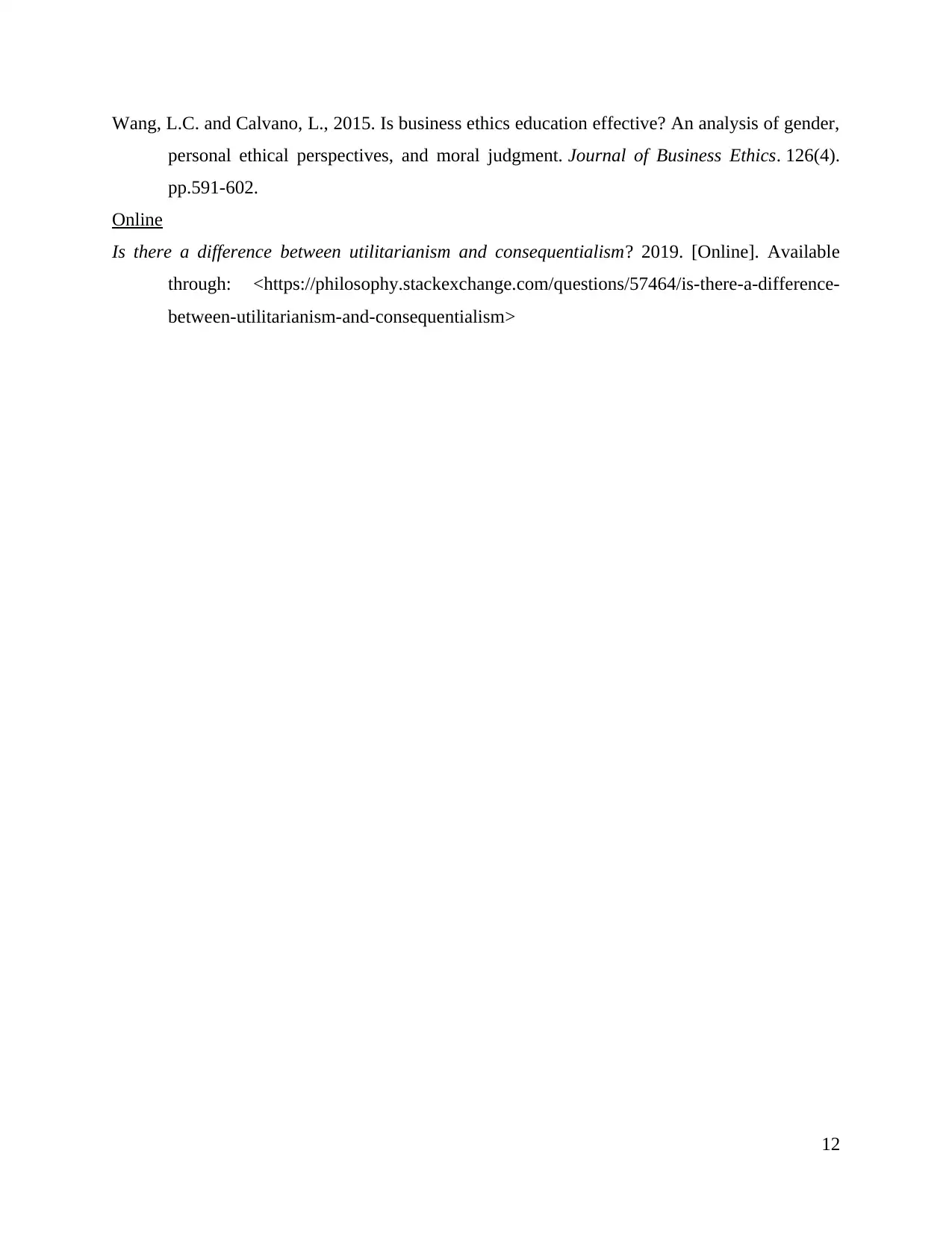
Wang, L.C. and Calvano, L., 2015. Is business ethics education effective? An analysis of gender,
personal ethical perspectives, and moral judgment. Journal of Business Ethics. 126(4).
pp.591-602.
Online
Is there a difference between utilitarianism and consequentialism? 2019. [Online]. Available
through: <https://philosophy.stackexchange.com/questions/57464/is-there-a-difference-
between-utilitarianism-and-consequentialism>
12
personal ethical perspectives, and moral judgment. Journal of Business Ethics. 126(4).
pp.591-602.
Online
Is there a difference between utilitarianism and consequentialism? 2019. [Online]. Available
through: <https://philosophy.stackexchange.com/questions/57464/is-there-a-difference-
between-utilitarianism-and-consequentialism>
12
⊘ This is a preview!⊘
Do you want full access?
Subscribe today to unlock all pages.

Trusted by 1+ million students worldwide
1 out of 15
Related Documents
Your All-in-One AI-Powered Toolkit for Academic Success.
+13062052269
info@desklib.com
Available 24*7 on WhatsApp / Email
![[object Object]](/_next/static/media/star-bottom.7253800d.svg)
Unlock your academic potential
Copyright © 2020–2026 A2Z Services. All Rights Reserved. Developed and managed by ZUCOL.





